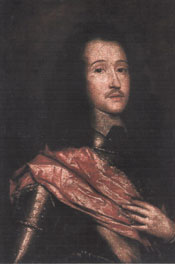
To Althea, from Prison
Encyclopedia

Richard Lovelace
Richard Lovelace was an English poet in the seventeenth century. He was a cavalier poet who fought on behalf of the king during the Civil war. His best known works are To Althea, from Prison, and To Lucasta, Going to the Warres....
in 1642. The poem is one of Lovelace's best known works, and its final stanza's first line ("Stone walls do not a prison make, Nor iron bars a cage") is often quoted. Lovelace wrote the poem while imprisoned in Gatehouse Prison
Gatehouse Prison
Gatehouse Prison was a prison in Westminster, built in 1370 as the gatehouse of Westminster Abbey and first used as a prison by the Abbot, a powerful churchman who held considerable power over the precincts and sanctuary...
for petitioning to have the Clergy Act 1640
Clergy Act 1640
The Clergy Act 1640 was an Act of Parliament of the Parliament of England passed in 1642 by the Long Parliament.-Preamble:...
annulled.
Althea's identity is unknown. "She may even have been a product of Lovelace's imagination. However, evidence suggests she was a woman named Lucy Sacheverell."
Recordings
The poem has been set to music by the British folk group Fairport ConventionFairport Convention
Fairport Convention are an English folk rock and later electric folk band, formed in 1967 who are still recording and touring today. They are widely regarded as the most important single group in the English folk rock movement...
and features on their album Nine. It has also been recorded by the folk group Three Pressed Men on their first album Daddy Fox.

